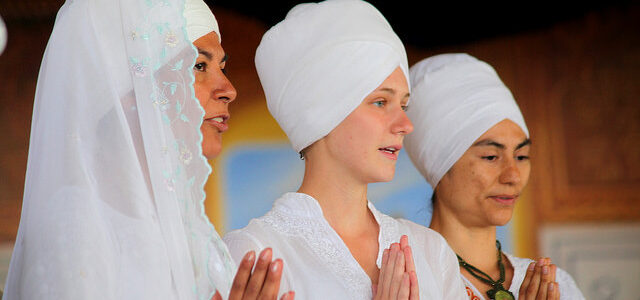Administering Sikh Vows
The Sikh Vows as given by the Siri Singh Sahib Bhai Sahib Harbhajan Singh Khalsa Yogiji are administered by an ordained Sikh Dharma Minister in Good Standing in the presence of Siri Guru Granth Sahib and the Sadh Sangat. Anyone who is ready to make a commitment to live the remainder of his or her life as a Sikh of the Guru is welcome to take Sikh vows. These vows should be thoroughly explained and understood before the ceremony takes place.
At this time, Sikh Vows are primarily given during the 3HO Summer and Winter Solstice and at the European Yoga Festival or by arrangement with a local Sikh Dharma Minister in Good Standing. Contact [email protected] for more information.
Suggested Procedure (From Victory and Virtue (Ceremonies & Code of Conduct of Sikh Dharma)
1. The presiding Minister explains the concept of Sikh Dharma and the Sikh lifestyle, the concept of conscious, righteous living, walking on the spiritual path and the relationship between a Sikh and the Guru.
2. The Minister asks those about to take their vows if there are any questions, and the questions are answered.
3. Those about to take their vows stand facing the Siri Guru Granth Sahib with hands folded at the heart. After the vows, they bow to the Guru, touching their foreheads to the ground in acceptance of the following:
A Sikh believes in the Oneness of God who has created this creation. The Creator and the creation are one. God’s essential Name is Truth.
The Siri Guru Granth Sahib is the only Guru of a Sikh. A Sikh looks to the Siri Guru Granth Sahib as a Living Guru. A Sikh considers any Hukam or other message from Siri Guru Granth Sahib as a direct communication from the Infinite.
A Sikh bows to no person as a Guru. A Sikh may accept a Spiritual Teacher, but knows that no Spiritual Teacher is a Guru.
A Sikh is encouraged to learn to read Gurmukhi, the language of Siri Guru Granth Sahib and is encouraged to read the Nitnem Banis (Japji Sahib, Shabad Hazare, Jaap Sahib, Tavprasad Swaye, Anand Sahib, Rehiras Sahib and Kirtan Sohila) daily, in any language.
A Sikh keeps his or her form as God has created it, not removing or cutting hairs from any part of his or her body.
A Sikh does not cut or trim any hairs from any part of his or her body. A Sikh also will not alter his or her body except for medical necessity. (This includes no tattoos and no circumcision.)
A Sikh shall tie his or her hair in a Rishi knot on the crown center at the top of the head and cover the head with a turban in public.
A Sikh shall wear a Kara (iron bangle) on the right wrist for males and on the left wrist for females. A Sikh is encouraged to wear the Bana of Guru Gobind Singh (chola/kurta, cumberband and churidars).
A Sikh shall rise to meditate upon God in the Amrit Vela (before the rising of the sun), and shall keep his or her mind centered upon the Name of God throughout the day. From time to time, the Siri Singh Sahib shares with us the most effective meditations to practice in those hours. Minimally, the Amrit Vela meditations should include Ek Ong Kar Sat Nam Siri Wahe Guru, the Mool Mantra, and the recitation of Japji Sahib (in any language).
Whenever possible, a Sikh should join with the Sadh Sangat to meditate together and to do devotional singing (Kirtan) in the Amrit Vela.
A Sikh shall earn his or her living by working in honest labor or service, to support himself or herself and his or her family. He or she shall not live solely on the proceeds of the work of others. His or her dealings shall reflect the highest ethical and moral standards.
A Sikh shall share his or her wealth with the needy, and shall give to support the Dharma. He or she shall stand ready to protect the weak and shall serve the community and humanity.
The Guru’s Sikh shall maintain the diet of the Guru’s Lungar; this means a lacto’vegetarian diet, excluding meat, fish, poultry and eggs.
The Sikh shall abstain from the use of drugs, alcohol and tobacco, in any form except for medical necessities.
Sikhs shall be celibate if single, and monogamous if married. A Sikh shall have no sexual relations outside of a legal marriage. A Sikh man shall consider all women, except his wife, as either his mother, his sisters or his daughters. A Sikh woman shall consider all men, except her husband, as either her father, her brothers or her sons.
A Sikh shall be of service to those in need, his or her family, the sadh sangat, the community, the nation.
Completing the Ceremony
If vows are given during a regular Gurdwara service, the service will continue after the vows are given. Or complete the ceremony with the following:
4. Kirtan–Any shabad may be recited. Shabads such as Gur satigur kaa jo sikh akhaa’ay, which are appropriate to the occasion are especially inspiring.
5. Song of the Khalsa
6. Anand Sahib (first five Pauris followed by the Slok of Japji Sahib.)
7. Ardas
8. Hukam (Gurmukhi and English Translation or translation into language of the sangat.)
9. Distribution of Guruprasad.

